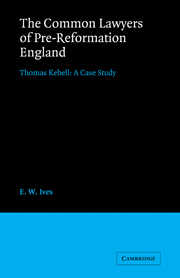Book contents
- Frontmatter
- Contents
- List of figures and tables
- Preface
- Abbreviations
- Manuscript sources
- Table of cases
- Introduction
- PART I THE LEGAL PROFESSION
- PART II LEGAL PRACTICE
- 5 The foundations of a legal practice
- 6 The lawyer and his clients
- 7 The lawyer and the year books
- 8 Thomas Kebell as an advocate
- PART III THE LAWYERS AND THE LAW
- PART IV THE PROFESSION AND SOCIETY
- Appendices
- Index
5 - The foundations of a legal practice
Published online by Cambridge University Press: 05 November 2011
- Frontmatter
- Contents
- List of figures and tables
- Preface
- Abbreviations
- Manuscript sources
- Table of cases
- Introduction
- PART I THE LEGAL PROFESSION
- PART II LEGAL PRACTICE
- 5 The foundations of a legal practice
- 6 The lawyer and his clients
- 7 The lawyer and the year books
- 8 Thomas Kebell as an advocate
- PART III THE LAWYERS AND THE LAW
- PART IV THE PROFESSION AND SOCIETY
- Appendices
- Index
Summary
The landmarks of a successful legal career are chronicled in professional and public records; less easy to uncover are the stages in building the law practice on which this success is founded. The professional papers of the pre-Reformation lawyer are a rare find; clients record the results of litigation, not the names of their advisers, and the courts are interested in cases, not the advocate who conducts them. It is thus no surprise that the first notice of Thomas Kebell in a professional role does not occur until he was over thirty, when in November 1470 he stood surety for a royal grant enrolled on the fine roll. Nevertheless, in this entry he is described as ‘gentleman of London’, a sufficient indication that he was already an established lawyer. What had occupied Kebell in the years before is a matter for surmise. Some men, such as his junior at the Inner Temple, Humphrey Coningsby, secured employment as a clerical officer in the royal courts; others such as John More, William Rudhale or Walter Rowdon practised as attorneys–there was as yet no apartheid between the branches of the profession. Another possibility is that Kebell ‘devilled’ for some more established lawyer. After 1470 he begins to appear more and more frequently in the records of legal business until, in 1474, he was prominent enough to be appointed J.P. for Leicestershire.
In the absence of news reporting, the ambitious lawyer could not hope to attract public notice by his conduct in some cause célèbre.
- Type
- Chapter
- Information
- The Common Lawyers of Pre-Reformation EnglandThomas Kebell: A Case Study, pp. 93 - 114Publisher: Cambridge University PressPrint publication year: 1983



